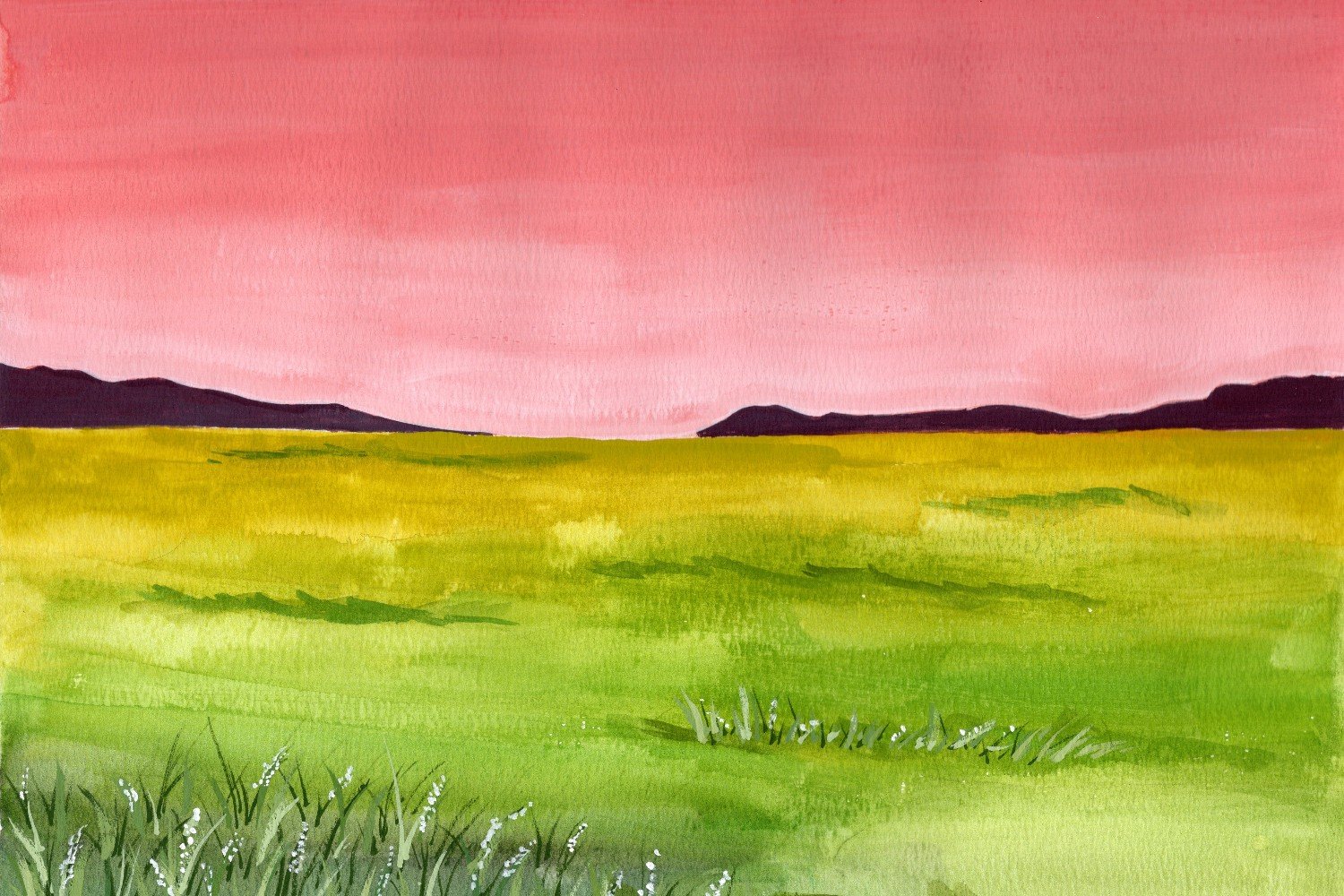Unraveling My Anxiety Spiral
This is your brain on anxiety—drawing and watercolor done by me.
I’ve been battling my demons again in June—you win some and lose some on this personal growth journey, although winning and losing is a terrible metaphor for the ebbs and flows of life. Just sayin’. I gave a tax workshop to a small group of theater graduates in late May—an opportunity that landed in my lap and was right up my alley, since I enjoy helping creatives wrap their heads around taxes. And boy, it triggered a lot of stuff for me.
I think I’ve mentioned on this blog that I grew up terribly shy, particularly starting around the time my family immigrated to the United States and I had to learn English from scratch. I was 11 by that time, so past the age when kids picked up new languages easily. I learned to avoid embarrassment by staying quiet as much as possible, and talking in front of people has been terror-inducing ever since. If I ever raised my hand to speak in class, my heart would race, and my body would break out in a sweat. Forget about presentations.
While it’s gotten better over the decades, speaking and communication in general has been my most entrenched area of wounding. I also figured out in recent years that I actually love sharing what I’m learning, so I have this love-hate, or more accurately, love-terror relationship with teaching.
Anyway, I gave the accounting workshop in May, was kind of stressed the week prior but thought I could handle it. Then the day of the workshop, I spent the morning trying to calm myself down, and during the presentation I was so anxious my stomach started hurting halfway through. Thankfully, I had a co-presenter who could field questions when I struggled—she had teaching experience and was why I dared to do it in the first place. It all went fine, really, from an objective point of view.
Of course, that didn’t stop me from beating myself up later.
I spiraled horribly after that. I knew the workshop went fine, but I couldn’t stop nitpicking. I tried to remind myself to see the positive—the effort I put into creating the workshop, how well it turned out, what I learned about the tax situations of theater folks I didn’t know before, how I could do it better next time. But those encouragements couldn’t match my condemning voices that questioned how I could ever share and teach the way I hope to if I can’t even talk in front of people without freaking out.
From there, I fell into weeks of self-doubt where I constantly compared my own writing to things I was reading and finding myself fall short. I was also battling fatigue and brain fog, which made things worse because these episodes always make me wonder if this is how things are going to be from now on. Oh my god I’m turning 40 and I’m gonna die some day. I’m aging and my brain is shriveling up. What if I never end up proving myself after all these years? What if it’s all downhill from here?
It was pretty nutty.
But “proving myself” turned out to be a key phrase. For most of my adult life, I’ve struggled to find a career that works for me. I’ve always wanted to do my own thing, and part of me once believed that once I found that thing, I’d make a lot of money and prove to everyone that I was right to follow my passions all along. That I can sidestep the Capitalist game and win at it—the Millennial dream. My sense of self-worth has always had to do with how much money I made, even though money has rarely been a motivation for me.
So in order to make money and prove myself, my writing had to be “good,” and by “good” I mean as good as writers I enjoy reading, not random blog posts on sites written for SEO (even though they also make money, it wasn’t the way I wanted to make money). On top of that, I judged every sentence I wrote by whether people would like it and how fast it could get my business going as a writer. All of this made my writing horribly heavy, stilted, and all over the place because I was vacillating between what I wanted to write versus what I thought people would read.
All of these challenges with writing were natural extensions of my challenges with speaking and communication. It’s always been anxiety-inducing for me to speak my truth to people except for the people close to me, and usually one-on-one. I tend to keep my thoughts close until I gauge that someone is safe to share with. Speaking in front of people meant putting myself out there without immediately knowing if it’s safe to do so—and that vulnerability can be terrifying. Writing shares similar risks. So I realized that in trying to work through my fears around writing, I was also working through the challenges I’ve always had around speaking.
I was sick of struggling with these patterns by this point and started looking for outside help, one of which was to see a new naturopath and checking my blood work. During my appointment, I mentioned having trouble with anxiety and asked for any suggestions she might have. She recommended the mindfulness-based stress reduction program (MBSR), a secular meditation course developed at the University of Massachusetts Medical Center in the 1970s by Jon Kabat-Zinn that had been part of many studies showing the effectiveness of mindfulness practices for stress-reduction and emotional well-being.
I’ve taken various types of meditation classes in the past and have practiced from time to time, though not consistently. In recent years, I thought about practicing it again knowing that it could be helpful with anxiety, but I just always had more interesting things to do than sit around focusing on my breath. This time, I was desperate enough to commit to whatever might help.
I ended up going with this free self-study MBSR course put online by a retired teacher of the course, since the live classes I found didn’t work with my schedule and, you know, I’m a cheapskate frugal. I scheduled an hour every afternoon to watch the videos, read the articles, and meditate for thirty minutes.
Very quickly, I learned things about meditation from this course I hadn’t understood before, or maybe I just forgot. I had always thought that meditation was about emptying your mind, watching your thoughts, and focusing on one point or object like your breath. Those concepts are still there. But through this course, I learned about paying attention with kindness and making sure to not judge myself or the thoughts that come through. I learned that the point is not just to stay focused, but to notice when your thoughts drift away and bring yourself back without judging—the awareness of your thoughts. I’d always seen getting distracted as “wrong” before.
I’m only a few weeks in, but the practice of not judging my thoughts and experiences immediately started giving me insights. Tracing back my thought patterns, I noticed what causes me to spiral into a knot of anxiety was an initial discomfort with not knowing where I was going, not having a clear course of action with regards to building a business from writing. I would feel an immediate fear, then place all kinds of judgments on that one feeling and what that meant. If I didn’t know where I was going, how could I make money doing it? What if it took years? What if it never worked and I couldn’t do something I love and still make it? And if I didn’t make money doing it, that meant I was just screwing around. If I can’t get the words out right, then that meant my writing wasn’t good enough and would never be good enough, and I’d never prove myself worthy. Then I’d feel bad I was even feeling this way. God, why was I so critical toward myself? How could I get rid of this? How could I even write about personal growth if I couldn’t get my own shit together?
And that’s just a small sample.
Often my thoughts weren’t even in words. They were so automatic that I’d just get lost in the feeling of them. Watching my thoughts and removing judgments about them stopped the spiral, stopped the reactions, and made me see the initial stimulus for what it was—just an experience, and one that’s rather common and benign. We don’t know what we’re doing when we start something new—we’re not supposed to. This is where creativity happens. Right here. This is where I’ve wanted to be all this time, and I got scared shitless because I’ve been so used to following clearly paved career paths. How often do we finally get what we want only to find out there is more to learn and more to live? Always, because life is not a perfectly styled Instagram post.
I’m learning that it’s okay to admit what I don’t know. It’s okay to look things up. It’s okay to ask for help. It’s okay to take longer than I expected. Most importantly, it is okay to still enjoy my life.
Recent Posts
Thanks for reading! I’d love to hear what you thought of it. Feel free to comment below or on my social media accounts.
If you enjoyed this piece, please consider making a contribution so I can spend more time doing it. Your support is greatly appreciated. ❤️































